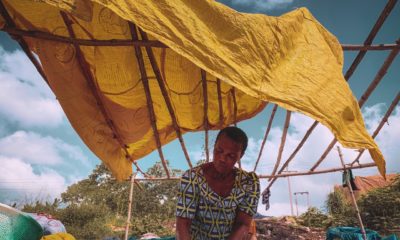Features
Adefolake Adekola: Environmental Effects of Slums in Nigeria
 UN-HABITAT (United Nations Human Settlements Programme) defined a slum as “a highly populated urban residential area consisting mostly of closely-packed, decrepit housing units in a situation of deteriorated or uncompleted infrastructure, inhabited primarily by impoverished persons.” A slum lacks basic amenities such as lack of electricity, clean water, sanitation services etc.
UN-HABITAT (United Nations Human Settlements Programme) defined a slum as “a highly populated urban residential area consisting mostly of closely-packed, decrepit housing units in a situation of deteriorated or uncompleted infrastructure, inhabited primarily by impoverished persons.” A slum lacks basic amenities such as lack of electricity, clean water, sanitation services etc.
According to UNICEF (United Nations Children’s Fund) and WHO (World Health Organization), over 4.5 billion people live without a household toilet. 862 million people still defecate in the open, 1.8 billion people have no good source of drinking water and one third of the world’s population have intestinal worm infections.
About 8% of global wastewater is recycled back into the ecosystem without being treated and 1800 children under the age of five die from diarrhea because of lack of hygiene, sanitation and safe water. Their study showed that access to these three basic amenities (hygiene, sanitation and safe water) could lead to the reduction in 842,000 deaths yearly.
According to UN-HABITAT, about a third (32%) of the world’s estimated population dwell in slums or places characterized as one; due to shortcomings such as lack of sanitation, poor housing structure and insecurity of tenure (Scalr, E.D et al., 2005). A projection that by 2030, about 1.7 billion people will be living in slums in under developed countries.
Earlier this year I visited one of the most popular and populated slums in Nigeria called Makoko, situated in Lagos State. This slum has a population of over 85,000 people and the numbers keep rising. It will shock you to know that a large percentage of them have mobile phones, yet there is no toilet for them to use. Instead, they use makeshift pit latrines while some go to the water to relieve themselves. There is the story of a boy who came out of his wooden house in the night to ease himself and never returned home. They later found his body afloat on the water, implying he had gone to urinate without seeing where he was stepping and drowned.
Before my visit, Makoko was engulfed in fire and left thousands of people homeless. The question now is, what stops this same tragedy from happening again? How many times are they going to have to rebuild their wooden houses? What is the Government doing about slums in Nigeria?
Nigeria has hundreds of slums in the country, this is because at least every state has an average of five slums with Lagos having as much as ten slums such as Makoko, Ajegunle, Bariga, Badia, Mushin etc. The good news is every country has slums even The United States of America and Great Britain have slums. However, their slums are not as bad as ours, because they still have some basic amenities and have political and social inclusion.
Here are some environmental impacts of slums:
Water pollution
Water pollution is a serious issue as it affects the daily lives of these people. There’s no safe drinking water for those living in these slums and they are exposed to water-borne diseases such as malaria, diarrhea, dysentery, typhoid fever. Stagnant water in the community as a result of poor drainage system can also cause diseases like dengue fever, leptospirosis.
Land pollution
Lack of access to sanitary means of waste disposal leads to poor health and can affect an individual. Accumulation of plastics, metals and other solid waste can lead to other forms of pollution such as air pollution. Majorly, some of these solid waste begin to leach heavy metals into the environment thereby, causing environmental degradation and other health related problems for both human and animals in the community.
Air pollution
Overcrowding causes shortage in air circulation which leads to various diseases. Most slums have 10 to 50 people staying in a makeshift house made for a family of five. This increases the chances of transferring airborne diseases and other vector diseases such as Ebola and monkey pox. Examples of disease that are communicable via air are Small pox, chicken pox, tuberculosis, suffocation, irregular breathing, and asthma attacks.
Marine extinction
Most slums are located in swampy areas or areas surrounded by water. When the people defecate and use the water as their refuse dump, it harms the aquatic species in that area. They migrate from that location and some die in the process.
All these environmental effects ultimately lead to poor standard of living, which shortens life span. Mortality rate is increased and indigenes die of unknown illnesses because of lack of pharmacies or licensed hospitals in their area.
Lack of knowledge hinders them from family planning, as they think condoms during sex is not necessary and are oblivious of ways to prevent childbirth. The poor living conditions also cause lowered IQ, growth development problems, stunted growth and premature death in infants and children.
Economic & Social Impact
- Political exclusion from nation building, elections, urban development and other state functions. Inaccessibility to basic amenities
- Social exclusion from carnivals, celebrations and other events. Social alienation is another name
- Increased crime rate
- Poor education systems and increased illiteracy
- Increased disaster rate
- Increased mortality rate
- Prevailing poverty
- Substandard housing. Most of them live on water or make-shift houses
- Constant sickness would lead to reduced productivity
While speaking with Mr Muyiwa Omopariola a Consultant Analyst, he explained his findings citing different examples. According to him, the original settlers in Abuja (Gwari) were relocated to urban houses. They were not consulted on how their houses should be built. Apparently, they believe they need to bend their heads before entering the house and the mud/hut houses provided that for them. If they had been consulted before building the modern houses, the contractor would have done special doors for them. They moved back to their hut.
The second explanation the consultant provided was on the borehole that was constructed in a community. After the borehole was completed, the sponsors noticed the villagers refused to fetch water from the tap but went to the stream instead. Their findings made them understand that the women preferred to go to the stream to discuss about their marital problems and it served as therapy for them. If the community was included in the process, they would have told them the favorable location for the construction.
It is important for the Government to know that the rehabilitation of slums is an urgent cry. They need to be transformed as they are an impending danger to the environment and to the health of the people living there. Nigeria needs to be actively involved in the accomplishment process of SDG (Sustainable Development Goals) by 2030.
By the next world toilet day (November 19th), more Nigerians should be provided with toilets, especially in slums. Residents should be involved in political and social activities. More NGOs (Non-Governmental Originations) should visit these slums and be more involved.
Photo Credit: © Znm | Dreamstime
























